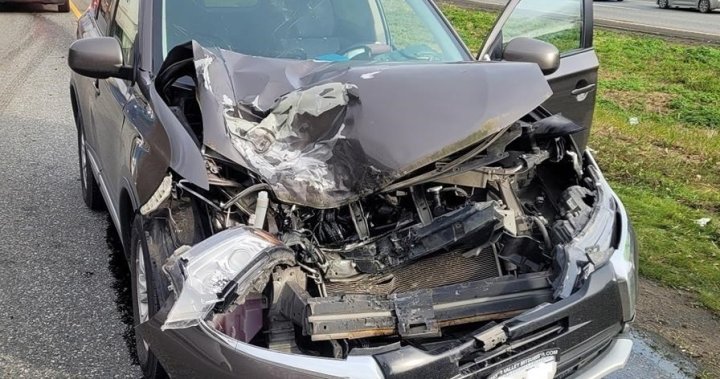Leanne Smith, a woman from Rosedale, B.C., shared her harrowing experience following a serious car accident on Highway 1, where a dump truck lost two tires and one struck her SUV. Smith described the moment as a terrifying rush; she spotted the tire coming toward her vehicle and instinctively slammed on the brakes. The tire collided with her hood, resulting in a loud explosion followed by a cloud of white smoke from the airbags deploying. Grateful to have made it to safety, Smith reflected on how a single moment could have drastically changed the outcome of the incident, especially if she had had a passenger in the car with her.
Despite the severity of the situation, Smith emerged with only minor injuries and was taken to the hospital for precautionary measures. Her remarkable ability to maneuver her SUV to the side of the highway and escape serious harm left her feeling as though divine intervention played a role in her survival. Shortly after the crash, the driver of the dump truck received a fine of $707 for making a false pre-trip statement and operating a non-compliant vehicle, which Smith deemed insufficient considering the potential consequences of the driver’s negligence.
The incident raised questions about accountability for commercial drivers, particularly regarding vehicle maintenance and inspections. Although the police confirmed that there was no evidence of impairment or distraction on the part of the truck driver at the time of the crash, Smith felt that the fine was a minimal consequence compared to the significant emotional and psychological impact of the collision on her life. The mishap not only left her family without a vehicle but also instilled trauma, pain, and nightmares, leaving her questioning the effectiveness of commercial vehicle regulations.
Smith strongly criticized the fine as an “absolute insult,” suggesting that it trivialized the severity of the incident and indicated a lack of seriousness towards road safety. She pointed out that the cost of one tire likely exceeded the fine itself and expressed concerns that similar incidents could continue to occur if drivers were not held to higher standards. Smith believes that the majority of truck drivers are responsible, but the few careless ones pose a threat and should face appropriate repercussions to encourage a culture of safety and accountability on the roads.
BC Highway Patrol also emphasized the need for stringent adherence to vehicle maintenance, highlighting that proper inspections could prevent such hazardous situations. Corporal Michael McLaughlin noted that the accident was entirely preventable and reiterated the agency’s low tolerance for poorly maintained commercial vehicles. Smith’s traumatic experience and the subsequent reaction from authorities reflect a broader concern regarding road safety regulations and enforcement for commercial trucking, as these regulations are vital for safeguarding both drivers and passengers alike.
In the wake of this incident, Leanne Smith’s call for heightened accountability resonates with many who advocate for road safety. As she continues to cope with the aftermath, her experience serves as a reminder of the dangers present on highways and the critical importance of responsible vehicle maintenance. Smith’s story underscores the need for continued dialogue about the safety of all drivers and passengers on the road, ensuring that regulatory frameworks evolve to reflect the necessity of rigorous vehicle inspections and accountability measures to prevent similar future tragedies.










